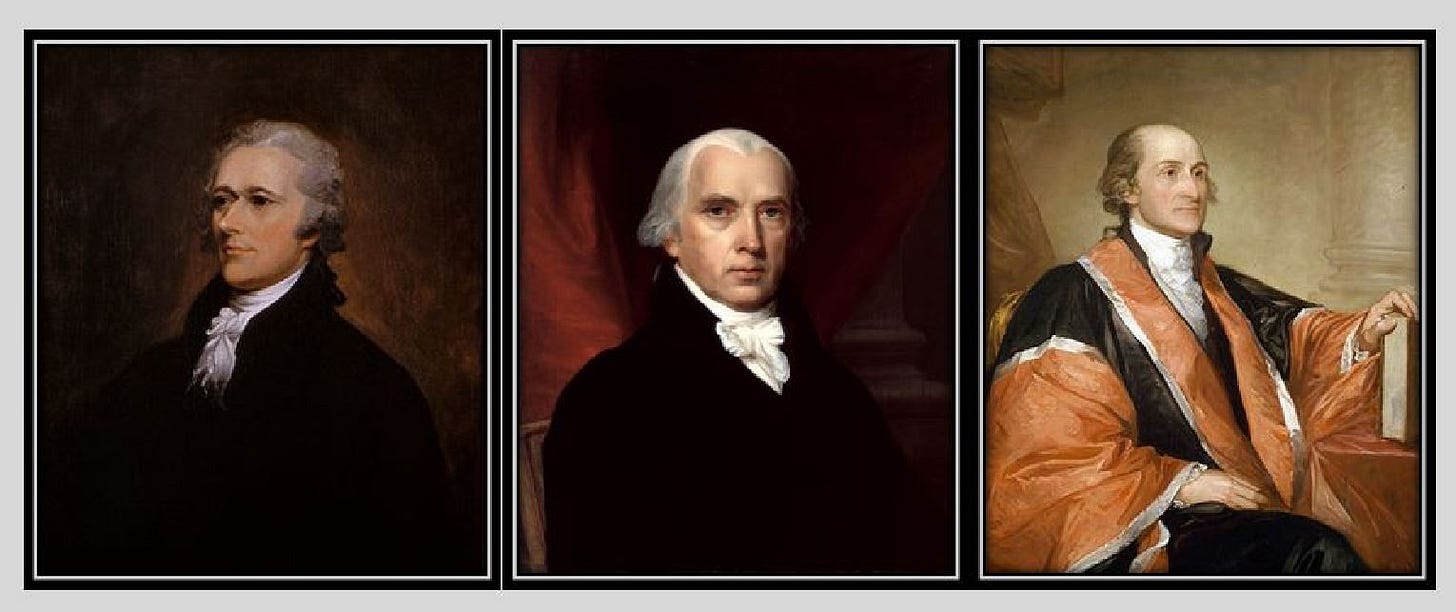TDIH: What are the Federalist Papers?
Perhaps the best explanation of what our Constitutional Convention produced.
On this day in 1787, “Publius” publishes an essay defending the Constitution in several New York newspapers. Publius?! Publius who? Most modern Americans have never heard of him. How unfortunate. The collection of works written by Publius was critical to the establishment of our Constitution.
We’ve been living with our Constitution for so long that it can be easy to forget what things were like before.
Perhaps you know that the Constitution was drafted in Philadelphia during the summer of 1787. But do you know what happened afterwards? Criticism began popping up almost immediately. Anonymous authors railed against the proposal in newspaper articles and pamphlets. The states had been asked to ratify the Constitution, but these so-called anti-Federalists were adamantly opposed.
Many of them simply wanted to start over. Wouldn’t a new Convention produce something better?
Something had to be done, and Alexander Hamilton was just the man to do it. The Constitution’s opponents were blasting out criticism in a rather disorganized fashion, but Hamilton would take a more calm and measured approach. He recruited John Jay and James Madison to help. Together, these three men would produce a series of 85 essays over the course of the next several months. These essays would methodically discuss—and defend—each section of the new Constitution.
Collectively, these essays came to be known as “The Federalist Papers.”
It’s important to remember where Americans were at that point in time: Many were not sure what to think of the Constitution that had just been proposed to them. The Constitutional Convention in Philadelphia had been conducted in secrecy, behind closed doors. This rule of secrecy had been adopted so that all delegates would feel free to speak their mind, but most people didn’t know that. Instead, they worried that the proposed Constitution was a plan to subvert republican principles of government. They worried that the government created would be too strong and would strip Americans of their liberties. They had, after all, only recently won their freedom from Britain. Why would they give away their hard-earned freedom so quickly and so easily?
In the end, local newspapers would carry the written debates between the Federalist and the anti-Federalists for months, until the Constitution was finally ratified during the summer of 1788. How wonderful that our founding generation was so active, interested, and involved in considering the principles upon which this country would be founded.
The body of work produced by Hamilton, Madison, and Jay was remarkable. Indeed, many of their peers considered the Federalist Papers to be the best explanation of what the Constitutional Convention had produced.
Thomas Jefferson, for instance, later included these essays as part of the curriculum at the University of Virginia. They were described as “an authority to which appeal is habitually made by all, and rarely declined or denied by any as evidence of the general opinion of those who framed, and of those who accepted the Constitution of the United States, on questions as to its genuine meaning.”
If only the Federalist Papers and the anti-Federalist Papers were required readings in our school today.
Sources can always be found on my website, here.



Tara, I agree. I am an old man and while my social studies and history courses in public school and even college taught much more about our Constitution, I wasn't really exposed to the Federalist and Anti-Federalist papers until becoming a follower of Tara Ross.
The point is, yes. It would be great if these documents were required reading for our young people, but they haven't been for a long while.
Plus, there is so much that has changed in the totality of how what is taught today compares to what was taught when I went to school.
It would be wonderful if our print and television media would take on the role of our schools and find an entertaining way to teach the fundamentals of our founding as a great nation.
Thank you Tara.
What a wonderful idea! Our children, citizens, being taught history!